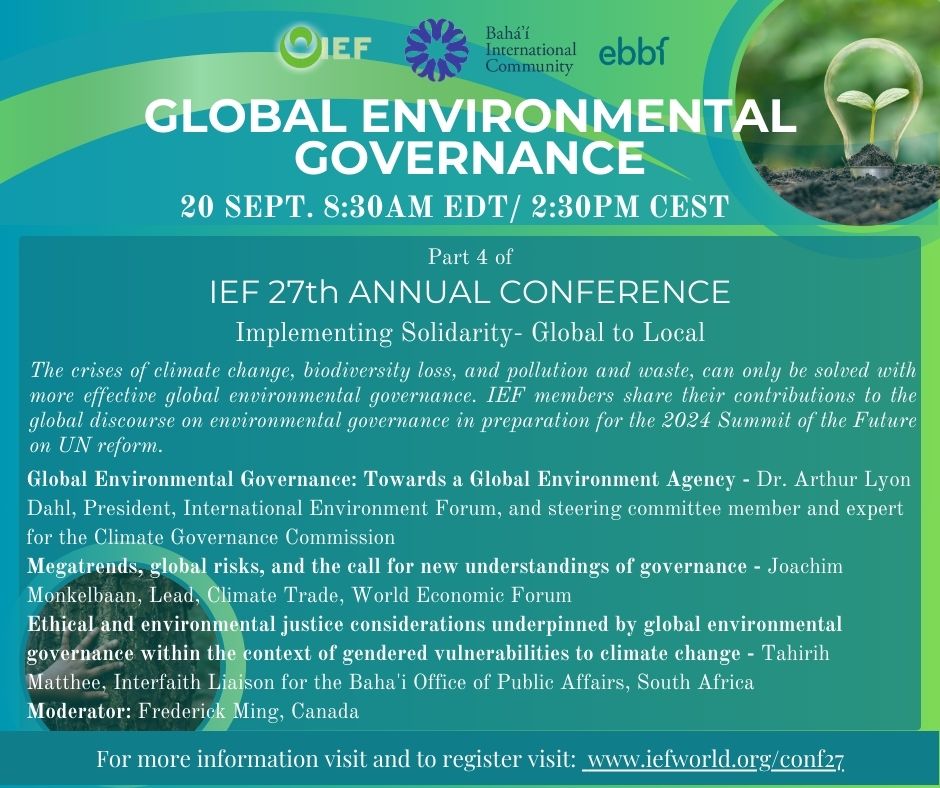
Global Environmental Governance

This event is part of the 27th Annual Conference of the International Environment Forum on “Implementing Solidarity – Global to Local”.
Despite more than half a century of international conferences, conventions, action plans and other efforts to prevent the destruction of the planetary environment, its decline is accelerating, with climate change, biodiversity loss, pollution and waste becoming existential threats to our future, and raising issues of social justice and eco-anxiety. Voluntary agreements depending on the good will of countries have not worked to protect the global commons. Only a global environmental institution with a mandate to adopt binding legislation based on the best scientific advice, to negotiate the equitable sharing of responsibilities to remain with planetary boundaries, and to enforce its decisions, might have a chance to save us in time from an eco-catastrophe.
Global environmental governance will certainly be an issue at the Summit of the Future (SOTF) in 2024, so this panel will show its importance as critical to addressing these existential environmental threats.
TOPICS AND PANELISTS:
Ethical and environmental justice considerations underpinned by global environmental governance within the context of gendered vulnerabilities to climate change
Presented by Tahirih Matthee, Interfaith Liaison for the Baha’i Office of Public Affairs, South Africa
The IPCC fifth assessment report has acknowledged the overlapping and intersecting nature of risks viz. geophysical, agro-ecological and socio-economic and highlights that differences in vulnerability and exposure related to non-climatic factors shape differential risks to climate change. Although some policy approaches aim at strengthening local communities’ adaptive capacity, significant aspects such as unpacking relations of power, inclusion in decision-making, and the need to change cultural habits that have denied the rights and opportunities of the marginalized and poor are lacking or missing from the critical discourse on climate change. In addition, research to date indicates that vulnerabilities to impacts of climate change are gendered. The time may be opportune to consider the needs of humanity and the planet within the framework of global environmental governance with effective measures, taking into account all aspects of climate change and sustainable development.
Megatrends, global risks, and the call for new understandings of governance
Presented by Joachim Monkelbaan, Lead, Climate Trade, World Economic Forum
The interaction between megatrends like environmental deterioration, climate change, geopolitical tensions, the erosion of social cohesion, and the rise of technologies such as artificial intelligence (AI) is becoming clearer by the day. The WEF’s Global Risks Report recognizes these simultaneous developments as “polycrises’. At the same time, we can see that extant governance systems struggle to address global challenges. This presentation aims to offer a number of fresh perspectives on governance that can be applied in practice by various stakeholders.
Global Environmental Governance: Towards a Global Environment Agency
Presented by Arthur Lyon Dahl, President, International Environment Forum, and steering committee member and expert for the Climate Governance Commission
We are facing multiple environmental crises that can only be resolved at the planetary level using a systems perspective, ending what the Secretary-General has called a “war on nature”. There is a larger global governance problem than just the environment, requiring UN reform. The many steps towards environmental governance since 1972 are not sufficient. A global environment agency is necessary to address interconnected global environmental challenges and protect the global common good, with a proposal prepared by IEF members now accepted by the UN HLAB. Further proposals are coming from the Climate Governance Commission. Global environmental governance may be the opportunity for a breakthrough towards binding global legislation because the science is so clear and the need so urgent.
